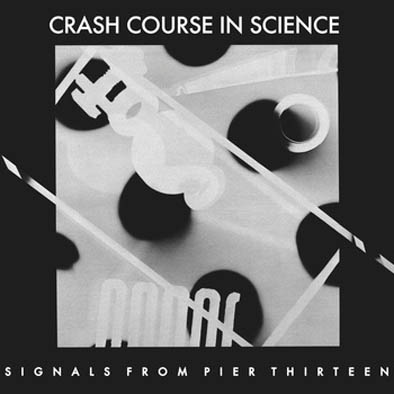 No one could ever say that the short-lived late '70s/early '80s minimal wave scene had a shortage of weirdos or eccentrics, categories in which this Philadelphia trio were prize specimens.  Fortunately, they were also kind of brilliant and have been remarkably influential for a band that only managed to release seven songs before breaking up.  While their more unhinged debut 7"certainly had its moments, this 1981 EP contains their two most enduring classics.
No one could ever say that the short-lived late '70s/early '80s minimal wave scene had a shortage of weirdos or eccentrics, categories in which this Philadelphia trio were prize specimens.  Fortunately, they were also kind of brilliant and have been remarkably influential for a band that only managed to release seven songs before breaking up.  While their more unhinged debut 7"certainly had its moments, this 1981 EP contains their two most enduring classics.
Amusingly, when I first became interested in this band, I looked them up on one of my favorite resources for obscure '80s music (Trouser Press) and saw that their entire oeuvre was summarily dismissed with one word ("grating").  Taken in any kind of large dose, that assessment is not wildly off the mark, but Crash Course in Science can also sound quite bracing, original, and vibrant when absorbed in moderation.  In any case, certainly something profoundly different was happening on this EP and the world probably was not ready for it at the time of its release.  Much of that singularity stems from CCIS's decision to eschew actual musical instruments in favor of toys and appliances.  That might not sound completely radical in today's post-noise musical landscape, but it actually still is: lots of bands may abandon instrumentation, but few do it so completely, and I cannot think of any that still attempt to make something resembling pop music.  It is incredibly hard to make catchy pop music without any kind of melody.
That said, the opening "Cardboard Lamb" does make some minor concessions to human ears: it has a very insistent one-note bass line, vocals, and an actual beat.  Of course, it also has plenty of white noise and some rather absurdist, minimal vocals (courtesy of Mallory Yago), but it was actually still catchy enough to become something of a minor club hit in the '80s.  More interestingly, it sounds an awful lot like LCD Soundsystem's "Losing My Edge," which cannot be a mere coincidence (despite CCIS failing to be one of the lucky bands James Murphy name-dropped in that song).
The trio scored yet another club hit with "Flying Turns," which some might remember as one of the absolute best songs on Stones Throw's The Minimal Wave Tapes, Volume I.  For me, "Flying Turns" is the single best example of why this band is so wonderful, as it is based upon little more than a simple metallic-sounding beat, something that sounds like a lunch whistle at a factory, and Yago's deadpan speak-singing and it sounds great: no clutter, no artifice, no development–just a relentlessly propulsive groove strafed by heavy industrial sounds.
The rest of the original EP was rounded out by the more caustic "Crashing Song" and "Factory Forehead," both of which are inspired, but lack the appeal of the EP's "poppier" moments.  "Factory Forehead" in particular is impressively heavy and unhinged by 1981 standards, sounding like Throbbing Gristle jacked-up to punk rock speed and intensity (as opposed to a misanthropic crawl).  Interestingly, the version of Signals from Pier Thirteen that is currently available (Schematic's 2011 reissue) appends two recent remixes (of "Cardboard Lamb" and "Flying Turns," naturally) that take Crash Course's sound in a very contemporary and professional direction, a decision that I find somewhat mystifying and very unnecessary.  I guess the remixes are ok and basically inoffensive, but they smooth over all of the bizarre quirks and character that made the songs great in the first place: it was not the songwriting that made "Cardboard Lamb" sound amazing, it was the entire aesthetic.
Releases like this make me deeply nostalgic for the days of 7"s and singles, as it is hard to imagine a band like Crash Course in Science getting noticed today: DJ culture aside, the current musical climate does not seem to have any place for bands that can do one extremely limited thing extremely well for a short burst.  The best moments of this EP are truly singular and wonderful, achieving a perfect blend of youthful exuberance, bold experimentation, humor, naiveté, obnoxiousness, rawness, and simplicity (and usually keeping it all under 3 minutes to boot).  Curiously, Crash Course in Science recorded a very likable full-length (Near Marineland) immediately after this EP that would have doubtlessly yielded a few more "hits" (like this one, for example), but it did not get mixed or released until Vinyl-on-Demand stepped forward to release a much-needed retrospective in 2009.
 
Read More

